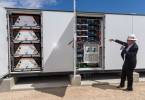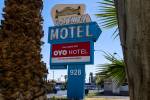NV Energy stands by meter plan
Power utility NV Energy on Tuesday defended plans for a digital-meter system that could change how ratepayers track and pay for power use.
State officials, consumer advocates and interest groups quizzed utility executives on the goals, financing and consumer protections involved in Advanced Service Delivery, a smart-meter initiative the company aims to begin rolling out in August.
The state Public Utilities Commission would need to approve NV Energy's proposal, and this week's hearings are crafted to hash out the plan's benefits and drawbacks alike.
Gary Smith, NV Energy's project director of smart technologies, called Advanced Service Delivery "the foundational infrastructure for the smart grid" -- a project that will integrate the utility's meters and back-office communications to set the stage for programs ranging from consumption management to electric-vehicle charging plans to variable pricing based on peak use.
Through Advanced Service Delivery, NV Energy would swap out conventional electric meters with "smart" meters capable of back-and-forth communication with the utility. NV Energy would spend $301 million to launch the program; the company has $138 million in federal stimulus money to help defray the cost. The rest could come from higher power rates if the commission approves.
Smith testified that Advanced Service Delivery would save NV Energy $35.6 million a year in operating costs once the utility has deployed all 1.45 million meters in 2012. Nearly 60 percent of those savings would come from work force reductions, and would happen in areas including meter-reading, field services and load research. The initiative would also create billing efficiencies, and improved information about power consumption would let NV Energy defer capital investments, Smith said.
Staffers and companies intervening with concerns about the proposal asked Smith wide-ranging questions Tuesday, including whether NV Energy will use Advanced Service Delivery to boost the number of disconnections for nonpayment and whether the implementation of Advanced Service Delivery will have "offramps" to exit the program if its launch goes awry. They also wanted to know about the potential for cost overruns, and they seemed especially concerned that they might not be able to revisit the "prudence" of Advanced Service Delivery after its rollout gets under way.
On the potential for more disconnections, Smith said NV Energy would not change its cutoff policies post-program. But Advanced Service Delivery will prevent scheduled disconnections from failing to happen because of labor shortages. Right now, if the utility can't schedule a worker to physically cut service, the nonpaying customer gets cycled back into the system, with fresh disconnection notices going out the next month. Advanced Service Delivery would prevent that, and net an increase of about 20,000 nonpayment terminations a year, Smith said.
State regulations allow power cutoffs when a consumer is $50 behind on payments. NV Energy's internal policies call for a $75 delinquency threshold. In practice, though, because of labor shortages, NV Energy doesn't begin disconnection processes until a customer is $100 past due. Advanced Service Delivery would allow the company to hold to its $75 line, Smith said.
Dave Norris, a senior deputy attorney general with the state Bureau of Consumer Protection, seemed concerned that NV Energy was asking the commission to find its investment in Advanced Service Delivery "prudent" now and going forward, and that would prevent state officials from examining whether the program was wise in retrospect if the initiative later proves problematic for consumers.
A two-year trial to test "dynamic" pricing, or variable power charges based on energy use in peak hours from 3 to 7 p.m. in the summer, would begin in January 2012. Consumers would have to opt into the program to participate, and must stay in the trial for at least a year once they've signed up. NV Energy plans to guarantee bills with a credit, if necessary, at the end of a year. The utility hopes to persuade 18,000 ratepayers to sign up for the test, though the trial would proceed if participation runs lower.
Norris also noted the possibility that Advanced Service Delivery could actually result in higher energy use overall, as consumers who shifted their consumption away from peak hours more than made up for their curtailing by increasing consumption during cheaper use periods.
Smith acknowledged that customers who are unable to shift use away from peak hours could see a noticeable increase in their bills when compared with current flat-use rates, though he stressed that they'd "take a benefit" from cheaper, nonpeak rates.
Laura Walsh, NV Energy's manager of regulatory pricing and economic analysis, said any switch from peak use to nonpeak use should result in lower bills for consumers.
"Compared to doing nothing (to shift use), they would save money," Walsh said. Changing use times "is what you would hope they would do," she added. "It's what prices incent them to do. Over time, we would expect to see some changes to the load shape and what the peak looks like. We'd hope to broaden and flatten that peak."
Walsh said little data exist on whether seniors and other residential users can actually shift air-conditioning and other power uses to lower-price periods. The dynamic-pricing trial phase should help NV Energy pinpoint just how flexible residential users can be in their energy use.
Public Utilities Commissioner Alaina Burtenshaw asked why the utility wanted to pursue peak pricing.
Smith said utility officials believed peak-use and pricing information would help ratepayers "take ownership" of their power use, and understanding how peak pricing might work in a market with hot-weather extremes "is something that would be very useful for the community."
"It would give customers options and choices," he said.
After the dynamic-pricing trial concludes, NV Energy would use its experiences with the initiative to shape optional time-of-use programs, Walsh said.
Dynamic pricing wouldn't raise or lower NV Energy's revenue, company officials testified.
Advanced Service Delivery hearings are scheduled to continue at 9 a.m. today inside the commission's office at 101 Convention Center Drive.
Contact reporter Jennifer Robison at jrobison@reviewjournal.com or 702-380-4512.
NV Energy presentation on new meters























